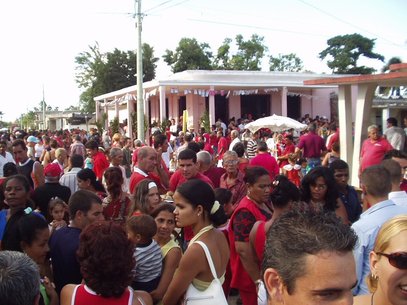Are You in the Yellow Pages?
 We aren't listed...
We aren't listed... People living in the modern western world are used to getting what they want when they want it. We expect the world to be organized into categories and information available and easy to access. If you need to find a doctor, you look here. If you need a carpenter, you look there. If you want to find a church, you type the name of your town and do a google search, and the list appears. More and more practitioners of Santería have created web pages advertising their services and making consultations available by telephone and skype for consumers who live around the globe. This is something our ancestors never imagined, and it stretches our traditions in uncomfortable ways. While there are no longer serious reasons why a Santero/a needs to hide his or her religious affiliations, it is still not the norm for practitioners to advertise for clients and promote themselves on the web. Yes, they are doing a service for people who are looking for spiritual guidance, but it doesn't replace the close personal relationships and ties to community that have characterized our religion for many hundreds of years.
Community Matters
 The community celebrates together
The community celebrates together Since I don't live in Palmira, I can only participate in that community when I go there for visits. The physical distance presents an obstacle to my involvement in community gatherings for religious celebrations, but my elders prepared me for living abroad by teaching me that the physical distance doesn't matter. I am linked to them by tradition and by our lineage, their ancestors are my ancestors now, I carry them with me in my heart, and I will always be part of that community, no matter where I go.
In parts of the U.S.A. where there is a large Hispanic-Caribbean population, like New York/ New Jersey and South Florida, people have reproduced the kind of close-knit religious community that exists in Cuba. They know each other, work together, and have active ilés that turn out new godchildren, hold misas espirituales, tambores, and conduct other ceremonies frequently. I imagine that someone who lives in Union City, NJ, or in Hialeah/ Miami can find a santero around the corner, just by looking for the person dressed in white, wearing the beads, and listening for the chanting and drumming coming out of someone's basement or back room. But, what if you live in Iowa or Oregon or Kentucky, or a small town in Wales or in northern Sweden? What do you do? Chances are you don't know anyone who practices the religion, and all you can do is reach out in the dark, asking stranger online to help you find your path.
Finding Your Way
 Don't rush into things
Don't rush into things This isn't the answer you want to hear, but it's the truth as I know it: if you are called to be in the religion, one way or the other, the Orichas will guide you where you need to go. You will unexpectedly meet people who will help you, you will come across unexpected opportunities, you will find yourself in situations where the religion becomes visible and accessible to you. You may have to travel, you will definitely need to keep your eyes open, you will need to pay attention to the possibilities that arise. There are santeros/as and babalawos almost everywhere in the world today. Some are visible and some are not. The professional person in the suit could be a santero/a, maybe it is the truck driver who delivers your new washing machine. Once you start to open your eyes, and especially when you start to venture out into the world, getting to know new people and moving in different circles, you will be surprised at what you see. The most important thing is to have faith and know it will happen when it's supposed to happen, if it's supposed to happen, and not let the urgency of your desire or your need drive you into unwise choices. Don't put yourself in the hands of someone whose credentials you don't know, don't hand over your money, your mind or your future to someone you don't trust. There are charlatans in every religion, and ours is no exception. It is better to be patient and wait for the right time, right place and right people, than to leap into a situation where you have a strong likelihood of becoming the victim or fraud or abuse.
 RSS Feed
RSS Feed
